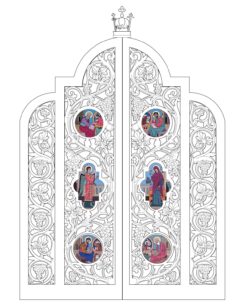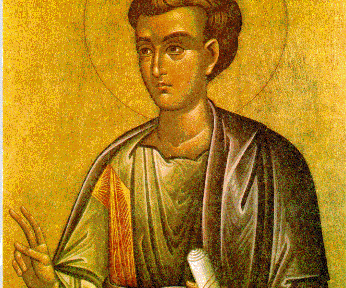Matthew, son of Alphaeus, was a tax collector when the Lord saw him in Capernaum and said: Follow Me. And he arose, and followed Him (Matthew 9:9). After that, Matthew prepared a reception for the Lord in his home and thus provided the occasion for the Lord to express several great truths about His coming to earth. After receiving the Holy Spirit, Matthew preached the Gospel to the Parthians, Medes and Ethiopians. In Ethiopia he appointed his follower Plato as bishop, and withdrew to prayerful solitude on a mountain, where the Lord appeared to him. Matthew baptized the wife and the son of the prince of Ethiopia, at which the prince became greatly enraged and dispatched a guard to bring Matthew to him for trial. The soldiers returned to the prince saying that they had heard Matthew’s voice, but could not see him with their eyes. The prince then sent a second guard. When this guard approached the apostle, he shone with a heavenly light so powerful that the soldiers could not look at him; filled with fear, they threw down their weapons and returned. The prince then went himself. Matthew radiated such light that the prince was instantly blinded. However, the holy apostle had a compassionate heart; he prayed to God, and the prince was given back his sight. Unfortunately, he saw only with physical eyes and not spiritual eyes. He arrested Matthew and subjected him to cruel tortures. Twice, a large fire was lighted on his chest, but the power of God preserved him alive and unharmed. Then the apostle prayed to God and gave up his spirit. The prince commanded that the martyr’s body be placed in a lead coffin and thrown into the sea. The saint appeared to Bishop Plato and told him where the coffin bearing his body could be found. The bishop retrieved the coffin with Matthew’s body from the sea. Witnessing this new miracle, the prince was baptized and received the name Matthew. After that, the prince left all the vanity of the world and became a presbyter and served the Church in a God-pleasing way. When Plato died, the Apostle Matthew appeared to the presbyter Matthew and counseled him to accept the episcopacy. He accepted the bishopric and, for many years, was a good shepherd until the Lord called him to His Immortal Kingdom. St. Matthew the Apostle wrote his Gospel in the Aramaic language. It was soon after translated into Greek and the Greek text has come down to us, while the Aramaic text has been lost. It is said of this evangelist that he never ate meat, but only vegetables and fruit. (Prologue of Ohrid)


 Continue reading November 16,2013 Holy Apostle and Evangelist Matthew
Continue reading November 16,2013 Holy Apostle and Evangelist Matthew
Month: November 2013
November 14, 2013 Holy and All-Praiseworthy Apostle Philip
Philip was born in Bethsaida beside the Sea of Galilee, as were Peter and Andrew. Instructed in Holy Scripture from his youth, Philip immediately responded to the call of the Lord Jesus and followed Him (John 1:43). After the descent of the Holy Spirit, Philip zealously preached the Gospel throughout many regions in Asia and Greece. In Greece, the Jews wanted to kill him, but the Lord saved him by His mighty miracles. Thus, a Jewish high priest that rushed at Philip to beat him was suddenly blinded and turned completely black. Then there was a great earthquake, and the earth opened up and swallowed Philip’s wicked persecutor. Many other miracles were manifested, especially the healing of the sick, by which many pagans believed in Christ. In the Phrygian town of Hierapolis, St. Philip found himself in common evangelical work with his sister Mariamna, St. John the Theologian, and the Apostle Bartholomew. In this town there was a dangerous snake that the pagans diligently fed and worshiped as a god. God’s apostle killed the snake through prayer as though with a spear, but he also incurred the wrath of the unenlightened people. The wicked pagans seized Philip and crucified him upside-down on a tree, and then crucified Bartholomew as well. At that, the earth opened up and swallowed the judge and many other pagans with him. In great fear, the people rushed to rescue the crucified apostles, but only Bartholomew was still alive; Philip had already breathed his last. Bartholomew ordained Stachys as bishop for those whom he and Philip had baptized. Stachys had been blind for forty years, and Bartholomew and Philip had healed and baptized him. The relics of St. Philip were later translated to Rome. This wonderful apostle suffered in the year 86 in the time of Emperor Dometian. (Prologue of Ohrid)


 Continue reading November 14, 2013 Holy and All-Praiseworthy Apostle Philip
Continue reading November 14, 2013 Holy and All-Praiseworthy Apostle Philip
November 13, 2013 Our Holy Father John Chrysostom, Archbishop of Constantinople
John was born in Antioch in the year 354. His father, Secundus, was an imperial commander and his mother’s name was Anthusa. Studying Greek philosophy, John became disgusted with Hellenic paganism and adopted the Christian Faith as the one and all-embracing truth. Meletius, Patriarch of Antioch, baptized John, and his parents also subsequently received baptism. Following his parents’ repose, John was tonsured a monk and lived a strict life of asceticism. He then wrote a book, On the Priesthood, after which the Holy Apostles John and Peter appeared to him, and prophesied that he would have a life of great service, great grace and great suffering. When he was to be ordained a priest, an angel of God appeared simultaneously to John and to Patriarch Flavian (Meletius’s successor). While the patriarch was ordaining John, a shining white dove was seen hovering over John’s head. Glorified for his wisdom, asceticism and power of words, John was chosen as Patriarch of Constantinople at the behest of Emperor Arcadius. As patriarch, he governed the Church for six years with unequalled zeal and wisdom. He sent missionaries to the pagan Celts and Scythians and eradicated simony in the Church, deposing many bishops guilty of this vice. He extended the charitable works of the Church and wrote a special order of the Divine Liturgy. He shamed the heretics, denounced Empress Eudoxia, interpreted Holy Scripture with his golden mind and tongue, and bequeathed the Church many precious books of his homilies. The people glorified him, the envious loathed him, and the Empress, on two occasions, sent him into exile. John spent three years in exile, and reposed as an exile on the Feast of the Elevation of the Precious and Life-giving Cross, September 14, 407, in the town of Comana in Georgia. Before his repose, the Holy Apostles John and Peter appeared to him again, as did the Holy Martyr Basiliscus (May 22) in whose church he received Communion for the last time. His last words were, “Glory be to God for all things,” and with that, the soul of the golden-mouthed patriarch was taken into Paradise. Chrysostom’s head reposes in the Church of the Dormition in Moscow, and his body reposes in the Vatican in Rome. (Prologue of Ohrid)


 Continue reading November 13, 2013 Our Holy Father John Chrysostom, Archbishop of Constantinople
Continue reading November 13, 2013 Our Holy Father John Chrysostom, Archbishop of Constantinople

